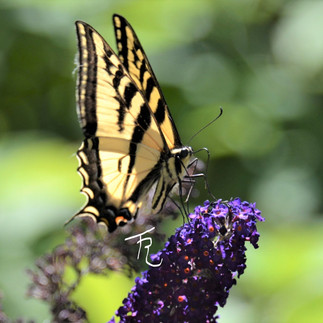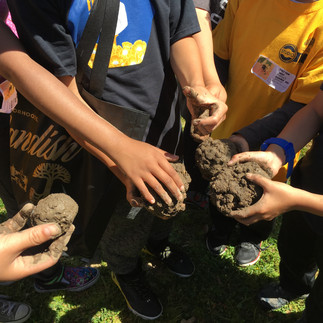
It’s full summer, for us and for the fauna of the Northern Hemisphere. That means many of our most charismatic, sun-loving pollinators are at the peak of their seasonal cycles – and we are celebrating National Pollinator Week (which took place June 17 - 23rd but should be celebrated every week) with Tora Rocha of the Pollinator Posse based in Oakland, CA – sharing all things love of pollinators.
Tora is a gardener and ecosystem steward, leader, and innovator in public gardening. Along with Terry Smith, a STEAM (Science, Technology, Engineering, Arts and Math) education specialist, Tora cofounded the Pollinator Posse developing and encouraging pollinator-friendly landscaping and fostering appreciation for local ecosystems through outreach, education, community science and habitat creation. With eco-friendly landscape techniques at the heart of the work, they teach respect for the creatures which keep their place — and the world — blooming.
The Pollinator Posse envision a day when life-enhancing, thought-inspiring green spaces will grace every corner of world.
"The Pollinator Posse came together in Oakland, CA in 2012, gathering a community around the issue of pollinator survival in urban settings. Individuals and groups with separate distinguished achievements in the fields of entomology, horticulture, education, public works and volunteer engagement saw an opportunity and accepted the challenge to support the indispensable work of pollinators by expanding habitat and awareness. A generous gift of $10,000 from Founding Sponsor, Clif Bar, launched the first Posse programs. With the ongoing support from many donors and volunteers, the Posse has established acres of pollinator habitat, maintained existing habitat and offered outreach and education to communities throughout Northern California and beyond.
"Tora was the Parks Supervisor at the City of Oakland for many years, responsible for all the landscaping on public facilities in the district. While working at Lake Merritt she realized that her own landscaping was adversely affecting the pollinators in the gardens and planted 12,000 pollinator friendly plants. She put in AirBeeNBee Houses at the Gardens there, showing children how to make bee condos or bee hotels- for native bees. She’s also the founder of the Autumn Lights Festival and a Rescape instructor."
In our ongoing exploration of who gardeners are and what they are cultivating in this world, in honor of National Pollinator Week, I am so pleased to share Tora's work forward.
ENJOY!
All images courtesy of Tora Rocha, all rights reserved.
You can follow Tora Rocha and the Pollinator Posse on line at:
And on Instagram:
HERE IS THIS WEEK'S TRANSCRIPT by Doulos Transcription Service:
IF YOU LIKE THIS PROGAM,
you might also enjoy these Best of CP programs in our archive:
JOIN US again next week, when we’re in conversation with Alexandra Zamencik of Native Seed/SEARCH, based in Tucson, AZ. For nearly 50 years Native Seed SEARCH has been conserving and sharing the seeds of the people of the desert Southwest and Mexico so that these arid-adapted crops continue to benefit their people and communities, and to nourish a changing world. That’s next week, right here, listen in.
Cultivating Place is made possible in part by listeners like you and by generous support from
supporting initiatives that empower women and help preserve the planet through the intersection of environmental advocacy, social justice, and creativity.
Thinking out loud this week:
Some of you may have seen my Instagram video message about this last week for the solstice. But I wanted to share it here too - maybe it’s like my form of reintroducing myself and this work to all of you new listeners out there – so glad you’re out there and right here with me gardening and growing along.
I relish this zenith daylight moment in the season, in the garden life cycle of growth. It’s a collectively noted and celestial contextualized pivot point - of ending and beginning again…the way garden life does. This feels like an opportune moment to do what I often ask guests on Cultivating Place to do – define our terms. I know some people turn away from the word garden and its sibling words: gardener and gardening, in favor of words with less history, less baggage. Less compromise born of colonization, capitalism, commodification, commercialization, and all of these wrapped up in the industry trying to sway gardeners.
But from my own work and experience, I think that a rejection of this word is an abdication and an orphaning somehow of all the biggest and most fertile, most potent and powerful manifestations of this word – from allotments and windowsills, to grand estates, smallholdings, flower farms, and sacred medicinal or utility plant patches and friends the world over.
The English word Garden goes back to the 1100s in English, brought to us from the old French, which of course developed it from somewhere else…because as we know people have been cultivating and tending plants in their places for myriad reasons since we were walking on two feet. And as we know other living beings also cultivate and tend in their places – ants farm or garden aphids.
With that front of mind, and From a purely human perspective, here is my definition of Garden – with a capital G: a place where humans cultivate and tend plants in the best interest and support of all of them: the place, the people, and the plants. The elegance of this definition is that inherent in it is habitat care, is land care, is communal and individual human care because as those of us in it know – they are all related. Fail on part of this equation and nothing else grows to its full potential.
Do all gardens or gardeners live up to the fullness of this ideal? No. But then again do all parents, teachers, chefs, artists, preachers, scientists or… lovers…. Live up the fullest meaning and potential of these roles? No. Does that mean we should not hold the ideal to grow towards? It’s only in setting the highest standard that we stand any hope of growing up to it – to restoring the ideal itself. And that standard is absolutely in the best interest of us all – the great biodiversity of plants and their animals, the depth and breadth of places and their soils, and watersheds, their geology and their history – climatic and human.
Be a capital G Gardener – on your windowsill, your wildscape, your summer zucchini patch or in your heart and your head.
And let’s be clear – I don’t actually care what you call yourself: steward, guardian, landholder, rewilder, ungardener - we all start somewhere on this journey of relating to and falling in love with plants in our places – if you are cultivating your place with care best you can, keep at it.
Myself, I am ok with remaining enrolled in the school of Gardening with a capital G – there is no better time, there are no better people to commit our lives to this best of all practices in what it means to live and love well.
WAYS TO SUPPORT CULTIVATING PLACE
Cultivating Place is a co-production of North State Public Radio, a service of Cap Radio, licensed to Chico State Enterprises. Cultivating place is made possible in part listeners just like you through the support button at the top right-hand corner of every page at Cultivating Place.com.
The CP team includes producer and engineer Matt Fidler, with weekly tech and web support from Angel Huracha, and this summer we're joined by communications intern Sheila Stern. We’re based on the traditional and present homelands of the Mechoopda Indian Tribe of the Chico Rancheria. Original theme music is by Ma Muse, accompanied by Joe Craven and Sam Bevan.
SHARE the podcast with friends: If you enjoy these conversations about these things we love and which connect us, please share them forward with others. Thank you in advance!
RATE the podcast on iTunes: Or wherever you get your podcast feed: Please submit a ranking and a review of the program on Itunes! To do so follow this link: iTunes Review and Rate (once there, click View In Itunes and go to Ratings and Reviews)
DONATE: Cultivating Place is a listener-supported co-production of North State Public Radio. To make your listener contribution – please click the donate button below. Thank you in advance for your help making these valuable conversations grow.
Or, make checks payable to: Jennifer Jewell - Cultivating Place
and mail to: Cultivating Place
PO Box 37
Durham, CA 95938





































Comments